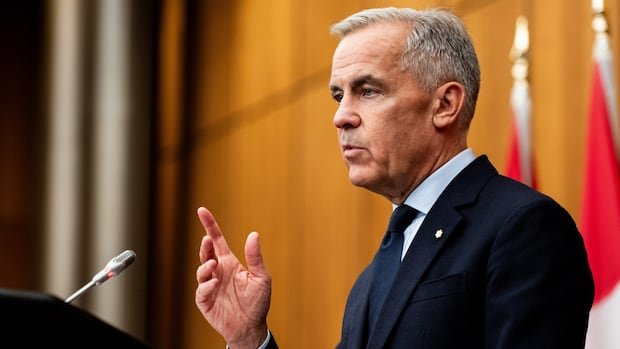Economic and security relationships take the spotlight as Prime Minister Mark Carney embarks on a series of meetings with allies in eastern and central Europe in the upcoming days.
In addition to visiting Germany, Carney will also travel to Poland and Latvia to engage with influential figures from the business and political realms, as well as Canadian military personnel stationed across the region.
During a recent discussion about the lifting of certain reciprocal tariffs on the United States, Carney acknowledged the importance of the German leg of his trip, emphasizing the potential for enhancing the existing partnership between Canada and Germany.
Scheduled to meet with German Chancellor Friedrich Merz in Berlin on Tuesday, Carney will also engage with key figures from the German business community, as revealed by a senior government official elaborating on the itinerary.
The German government issued a statement announcing the planned meeting ahead of Carney’s press briefing on Friday.
In Poland, where Carney arrived on Saturday, Canada is set to solidify a bilateral strategic partnership focused on energy and security matters, in addition to interacting with Canadian troops stationed in the country.
In Latvia, Carney will have the opportunity to observe the Canadian-led NATO brigade firsthand and is slated to meet with the Prime Minister of Latvia, Evika Siliņa.
A senior official, speaking on background, highlighted the significance of this European visit in strengthening ties with allies and advancing collaboration in various crucial areas such as trade, energy, critical minerals, and defense.
Accompanying the prime minister on different segments of the trip will be Energy and Natural Resources Minister Tim Hodgson and Defence Minister David McGuinty.
The series of meetings with allies comes amidst uncertainty surrounding U.S. President Donald Trump’s efforts to facilitate a peace agreement between Russia and Ukraine.
Following a recent summit between Trump and Russian President Vladimir Putin, Russia escalated its bombing campaign, launching one of its most intense missile and drone assaults since the invasion of Ukraine in February 2022.
Russian Foreign Affairs Minister Sergei Lavrov mentioned in an interview that there are currently no plans for a Putin-Zelenskyy summit, as discussions on the agenda are still pending.
Meanwhile, Ukraine is seeking concrete security assurances from allies, including the U.S., prior to committing to a potential peace deal, with Carney confirming discussions on this matter with Trump.
As a member of the “coalition of the willing” alongside France and Britain, Canada is expected to play a role in providing security guarantees, although the specifics of this involvement remain uncertain.
General Jennie Carignan, Canada’s top military commander, mentioned ongoing consultations with allied defense chiefs to determine the extent of each country’s contribution to the situation.
The shape of Canada’s role in providing security guarantees will largely depend on the nature of the ceasefire or potential peace agreement, with a focus on the need for training and support to enable Ukrainian forces to ensure their own security, according to Carignan.
Meanwhile, in Kyiv, the Secretary General of NATO met with top Ukrainian officials to collaborate on ensuring robust security guarantees to prevent future attacks on Ukraine by Russia.
Mark Rutte emphasized the joint efforts of Ukraine, European allies, and the United States in establishing security assurances that deter any future aggression from Russia towards Ukraine.

